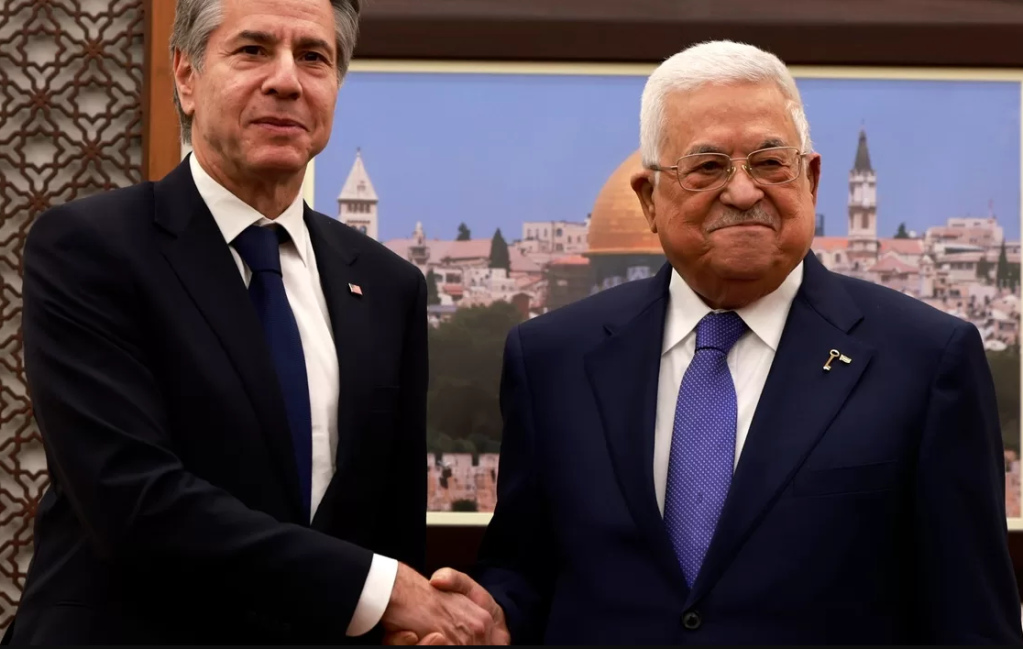By Aníbal

A wide range of bourgeois forces and personalities advocate the creation of a Palestinian state. The moment they do so and the conditions in the region and in the international inter-imperialist power relations are not of secondary importance. Gaza has been razed to the ground. The West Bank has numerous Jewish settlements, heavily armed, with terrorist activist sectors supported by Israeli state security forces. Of East Jerusalem, the press recently said it was “about to explode.”
Blinken and the U.S. government claim to be committed to a Palestinian state led by a reformed Palestinian National Authority (PNA). The PNA would dispose of all the money, apart from the Israeli government’s tax money. At the same time, the PNA tolerates the offensives of the Israeli army Tsahal-IDF and its internal security forces. In the West Bank, support for Hamas is increasing, and support for the PNA is decreasing.
Among Arab and Islamic states, the majority want a Palestinian state, but for them, “a quarter state” is enough, controlled by Israel’s army and police force. Blinken, the U.S. Secretary of State, has made offers of investment and business, as well as international presence, to “ensure the two-state process in the region” to follow the dynamics of the Abraham Accords. Behind the mask of humanitarianism and pro-Palestinian commitment are commercial and financial interests.
Turkey and Qatar want something more, but what they want is limited to co-decision over the future Palestinian state entity and assurances that Hamas leaders can go into exile.
Iran and the “Axis of Resistance” want more, but they are systematically and violently shut out. For their part, they resist a frontal military confrontation: Today, China and Russia, the leaders of the imperialist bloc to which they belong, are not interested in such dynamics that could ignite a Third World War. Therefore, they limit themselves to this limited war “by proxy,” as described by many analysts of “international geostrategy.”
In such a context, and given these balances of forces, the Palestinian state structure, if it is established, will be a mini-state controlled by bourgeois forces, especially from outside Palestine. It will be a reduced state, with settlers in the West Bank as internal tumors, and used as a Palestinian administration to hinder and repress Hamas. In the process, it will have to deal with a large segment of the population, especially the youth. Proletarian labor will be even more uncompromisingly dominated for the sake of employment in the many businesses that will supposedly rebuild the devastated Gaza Strip.
The Palestinian “quarter state” will replicate the role of second-class viceroy that the PNA administration now plays in the West Bank. Even more guarded and subjugated by the capital of the region, from that of Israel to that of Saudi Arabia.
What a fantastic “liberation” this machine of oppression brings to the proletariat, used by Palestinian nationalist tendencies as a reservoir of fighters and labor. A proletariat that, especially in Gaza, will be framed by the petty bourgeoisie, heavily affected by the Israeli military assault, impoverished, with destroyed houses, stores, small workshops, and installations. PNA funds for establishing agro-livestock cooperatives will be limited, and the marketing area of the merchant citizenry is highly saturated and divided among zones through Fatah clientelism.
Similarly, the contingent of Palestinian workers sent to Israel daily for work in construction and services is limited or expanded according to the interests of capitalism and the state of Israel. Jordan will continue to say that it is concerned that Israel will restrict the presence of Palestinian workers on its territory due to suspicion of terrorism. Repressive control will become more acute, and pressure on wages and working conditions will intensify. Israel’s employers are looking for labor quotas in other countries, and those who have not been hired since this war began are seeing their incomes dwindle and are putting themselves in debt.
(13-1-2024)
Pingback: Is de vorming van een Palestijnse staat een oplossing voor het proletariaat? – arbeidersstemmen
Pingback: Ist die Gründung eines palästinensischen Staates eine Lösung für das Proletariat? – Arbeiterstimmen